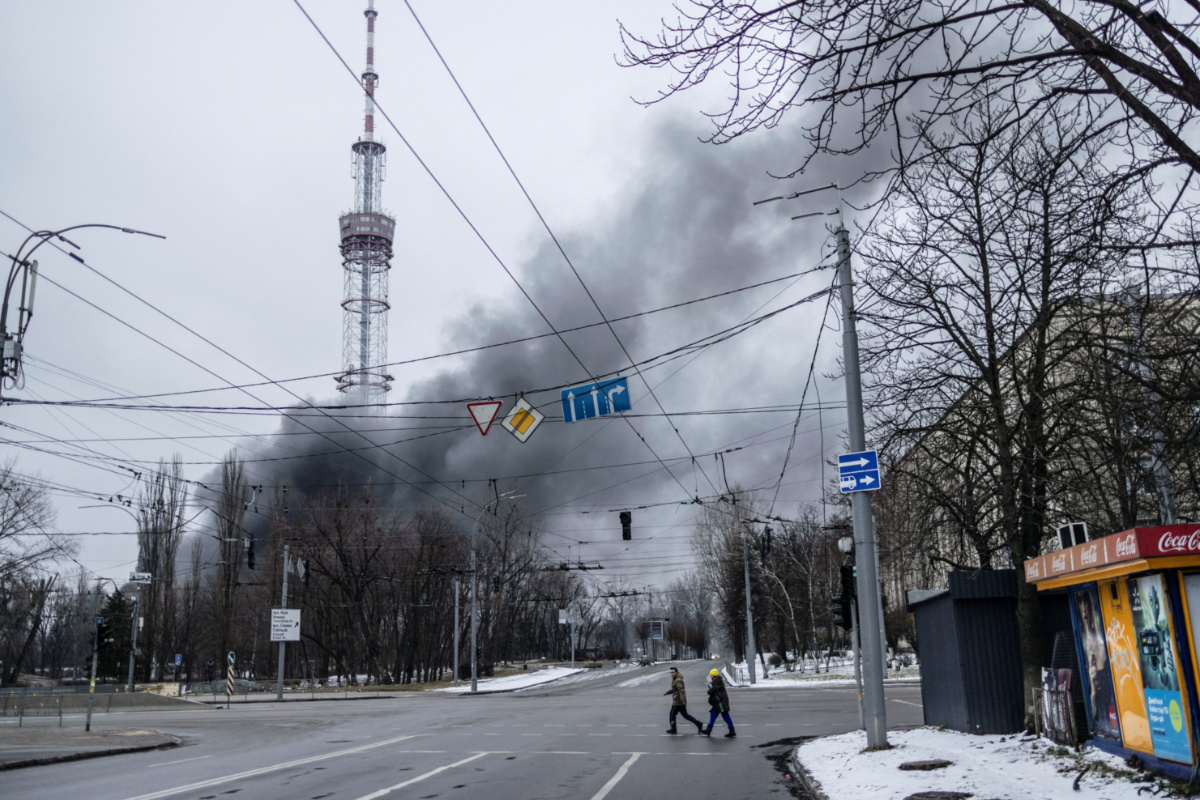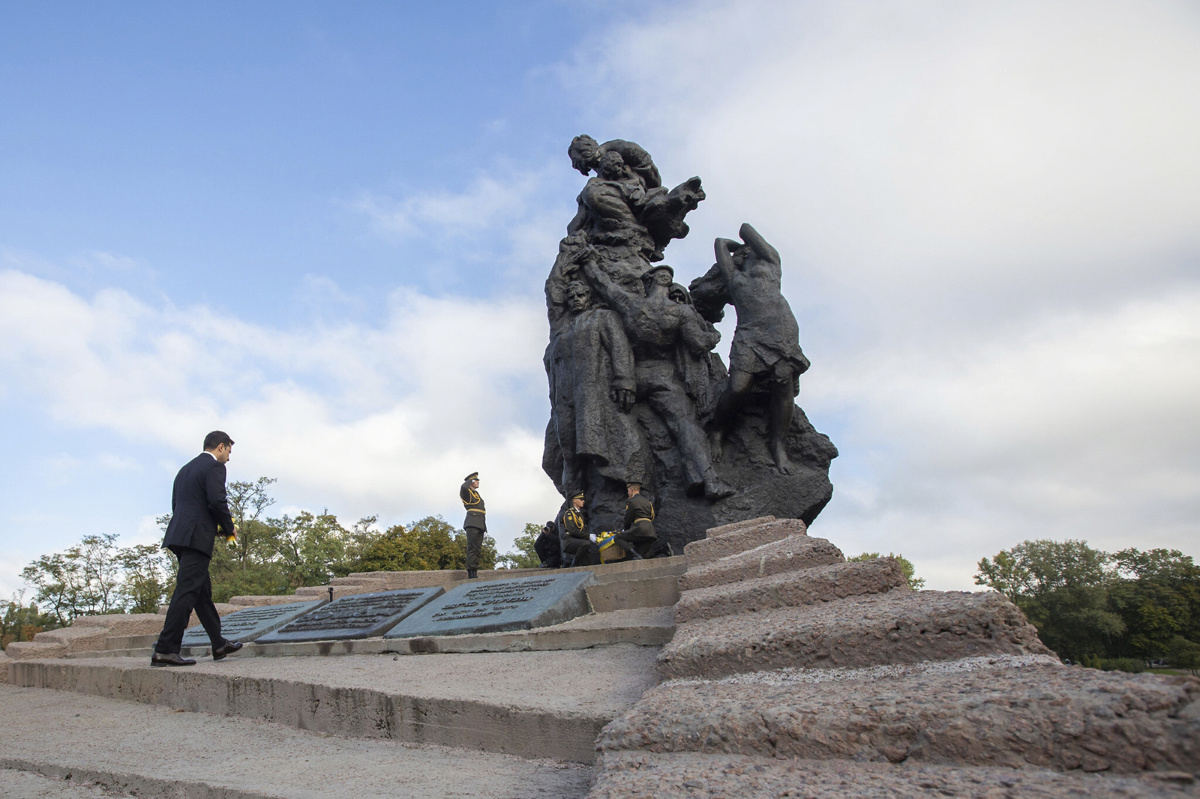As soon as a projectile hit Kyiv’s main radio and television tower, a short walk from the Babyn Yar Holocaust Memorial Center nearby, on Tuesday, Jews worldwide reflexively shuddered.
It’s unclear if the Russians targeted the memorial centre. More likely, they were interested in knocking Kyiv’s television stations off the air. Five people were killed in the strike.
But the proximity to the site where 33,771 of the city’s Jews were systematically shot dead by machine-gun fire in a two-day killing spree in 1941 is traumatic. Israel’s Yad Vashem Memorial issued a statement condemning the attack. So did the United States Holocaust Memorial Museum and the American Jewish Committee.

Smoke billows from the TV tower, amid Russia’s invasion of Ukraine, in Kiev, Ukraine, on 1st March. PICTURE: Reuters/Carlos Barria.
For many Jews, Ukraine brings up memories of pogroms, anti-Semitism and Nazi collaboration. Between 1.2 million and 1.6 million Jews were killed in Ukraine during the Holocaust. But Jewish life in Ukraine is no longer what it was – neither under the Nazis nor the Soviet Union.
And incredibly enough, in 2019 Ukraine elected a Jewish president, Volodymyr Zelenskiy, by a landslide – 73 per cent of the vote.
Though he is not a religious Jew, Zelenskoy has never shied from professing his Jewish identity. Some of his family members were executed by the Nazis, including three great-uncles.
On Tuesday, he tweeted forcefully after the strike: “what is the point of saying ‘never again’ for 80 years, if the world stays silent when a bomb drops on the same site of Babyn Yar?”
Despite efforts to suppress the memory of Babyn Yar during the Soviet years, Ukraine has conducted Babyn Yar commemorations on a regular basis since it became independent in 1991, recognizing that under the auspices of the Nazi regime and its collaborators, tens of thousands of Jews and others, including Roma, were executed.
A menorah-shaped monument to the Jewish victims of Babyn Yar was erected on the 50th anniversary of the mass shooting. Last year, the Babyn Yar Holocaust Memorial opened there.
“Today’s generation is certainly not antisemitic like it was in the Soviet Union,” said Andrej Umansky, a postdoctoral fellow at Georgetown University’s Center for Jewish Civilization who grew up in Kyiv.
In fact, said Umansky, “We know so much more about what happened in Ukraine to the Jews thanks to Ukrainian scholars.” Many of whom, he noted, are not Jewish. (Under the Soviets, there was no public discussion of the Holocaust. The Babyn Yar site, for example, acknowledged only that Soviet citizens had been massacred there.)
Recent surveys bear a new attitude toward Jews. A 2017 Pew Research study found that Ukraine was the most accepting of Jews among all Central and Eastern European countries. Only five per cent of Ukrainians in the survey said they would not accept Jews as fellow citizens. In neighbouring Russia it was 14 per cent, in Poland 18 per cent and in Romania 22 per cent.
That makes Vladimir Putin’s pretext for invading, aimed at “denazifying” Ukraine, ring particularly hollow, if not utterly hypocritical.
There is no state-sponsored anti-Semitism.
“The world opened up and people started to learn about religions and nationalities,” said Misha Galperin, a native of Ukraine who is now president and CEO of the Weitzman National Museum of American Jewish History in Philadelphia. “People began to travel elsewhere. They got a different exposure to Israel, among other places. Odesa has a regular flight to Tel Aviv. It’s only three hours. It became real and humanised.”

Ukrainian President Volodymyr Zelenskiy attends a ceremony at the monument to Jewish victims of Nazi massacres in Kyiv, Ukraine, on 29th September, 2021. The ceremony commemorated the 80th anniversary of the Nazi massacre of Jews at the Babyn Yar ravine, where at least 33,771 Jews were killed over a 48-hour period on 29th September, 1941. PICTURE: Ukrainian Presidential Press Office.
Mark Levin, CEO of the National Coalition Supporting Eurasian Jewry, said that after the mass exodus of Jews from Ukraine in the wake of the Soviet Union’s fall, Jewish populations in both Ukraine and Russia were able to rebuild and expand their communities though they are not nearly as large as they used to be. There are estimates of between 50,000 and 100,000 Jews in Ukraine.
“In the last 30 years there’s been a renaissance of Jewish life and a building of new Jewish institutions, be it religious, cultural, educational, social,” Levin said. “These are important Jewish communities in the Diaspora today.”
Haredi Jews from across the world travel by the thousands each year to Uman, a city in the central region of Ukraine, that is a pilgrimage site where a famous Hasidic rabbi is buried.
Most Ukrainians, said Umansky, see Jews as part of Ukraine’s history.
“Life in the Soviet Union was constant antisemitism against Jews,” said Umansky. “It’s not like that now.”





